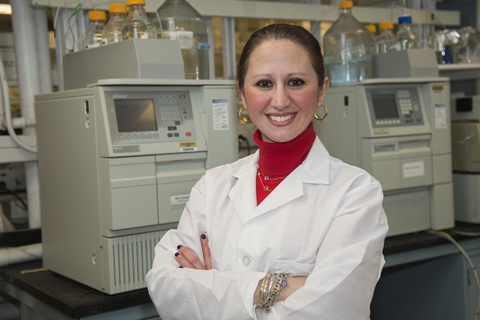March 3, 2016
Purdue Profiles: Gozdem Kilaz
 |
|
Gozdem Kilaz, assistant professor of engineering technology. (Purdue University photo/Mark Simons) |
The research projects of Purdue engineering technology professor Gozdem Kilaz are truly diverse, extending from Indiana's cornfields to U.S. Navy aircraft. But it's that diversity, Kilaz says, that originally pulled her to the field of chemical engineering, leading to projects in which she has collaborated with colleagues around the world.
Kilaz, a native of Turkey, earned her bachelor's and master's degrees in chemical engineering from Bogazici University, Istanbul, Turkey. She came to Purdue in 1999 to earn her doctorate, also in chemical engineering. Currently her focus is on sustainable energy with grant-funded projects related to aviation biofuels. Kilaz works as the chief scientist of the Air Transport Institute for Environmental Sustainability (AirTIES), has a courtesy appointment to the Laboratory of Renewable Resources Engineering (LORRE) research center and is among the faculty involved in the Purdue Navy Enterprise Partnership Teaming with Universities for National Excellence (NEPTUNE) Power and Research Center announced in October.
In addition, Kilaz was among 15 faculty initially appointed to the Purdue Polytechnic Educational Research and Development team targeting transformative innovation in learning, which is part of Purdue Moves. Here, she responds to questions about her work and interests.
What drives your interest in chemical engineering?
When I was in high school, I really did like math and sciences. So my advisors said I should start thinking about engineering. At the time, when I learned more about each different engineering field, chemical engineering sounded like the combination of science and engineering, so it opens doors to multiple pathways. You can go ahead into pharmaceuticals, polymers, mechanics, biomedical or agricultural. The abundance of pathways I could go with really interested me. That's why I started in chemical engineering.
I strongly believe in sustainable energy. I think more and more we're going to realize that if you are doing good things for the people, for the environment, it makes sense and that's the way to go. I would like to be able to experiment a little with chemical and materials and I still would like to stay in energy because we all consume energy. It's a must and we have to make sure we find a renewable way for our next generations.
What is your part in Purdue's NEPTUNE center?
One thing crucial to realize is that our military is very invested in sustainable energy. We currently depend on foreign oil, but are aggressively seeking solutions to become energy-independent in the very near future.
We want to be able to fine-tune the aviation fuels manufacturing process to almost make the fuel behave the way we want. Impurities in these fuels are a big concern in these aircraft. The different thing about aviation fuels is, unlike our cars, whatever we put in the aircraft is not only used for power, but also for the hydraulic fluid and the cooling medium. It's a one-stop shop. One fuel has to do everything the aircraft requires for 30 years or so. The aviation industry is very stringent in making sure whatever is in the fuel is not going to cause any trouble in the aircraft for a long time. Durability and safety are very, very important.
What are your thoughts on the Purdue Polytechnic initiative targeting transformative innovation in learning?
[Dean Gary] Bertoline started this wonderful action so we can make sure our students become industry-ready when they leave here. They will leave with a big portfolio of hard but also soft skills that make them really successful in their future lives. We're not only going to be raising technologists that will be able to write programs or break apart an aircraft engine, but they will also be able to talk and interact and lead and be a good team player.
I strongly believe in Polytechnic. This is not a cookie-cutter education for every type of person. It's wonderful to be able to give more control to the students and make the teaching and learning process more student-centered. It steps away from the 'sage on stage' approach and instead we share the learning experience by having students take an active role in what they learn and how they learn. Many of the students who were quiet and timid in high school find that they belong in this kind of classroom. They come more intrinsically motivated and realize they want to learn.
Writer: Brian L. Huchel, 765-494-2084, bhuchel@purdue.edu

